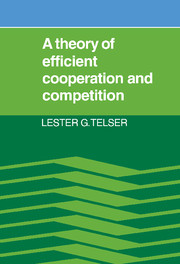Book contents
- Frontmatter
- Contents
- List of tables
- Preface
- Chapter 1 Prologue
- Chapter 2 Perceptions and reality: the genesis of the Sherman act
- Chapter 3 Competition, cooperation, and efficiency
- Chapter 4 Stable coalitions
- Chapter 5 Equilibrium with decreasing average cost: an application of the theory of the core illustrated by production and exchange among spatially separated markets
- Chapter 6 A theory of self-enforcing agreements
- Chapter 7 Some new results on duopoly applied to theories of Cournot, Bertrand, and Edgeworth
- Chapter 8 Rivalry by means of innovation
- References
- Index
Chapter 3 - Competition, cooperation, and efficiency
Published online by Cambridge University Press: 03 November 2009
- Frontmatter
- Contents
- List of tables
- Preface
- Chapter 1 Prologue
- Chapter 2 Perceptions and reality: the genesis of the Sherman act
- Chapter 3 Competition, cooperation, and efficiency
- Chapter 4 Stable coalitions
- Chapter 5 Equilibrium with decreasing average cost: an application of the theory of the core illustrated by production and exchange among spatially separated markets
- Chapter 6 A theory of self-enforcing agreements
- Chapter 7 Some new results on duopoly applied to theories of Cournot, Bertrand, and Edgeworth
- Chapter 8 Rivalry by means of innovation
- References
- Index
Summary
Introduction
In a contest to name the words most often used by economists, supply, demand, market, and competition would be among the leading contenders. These words represent complex and subtle concepts. I choose them intentionally because they are all intertwined. The relations among them would interest few outside the circle of professional economists were it not that beginning in 1890 with the passage of the Sherman act, the policy of the United States seems to have embarked on a course never before seen among nations. This course was to preserve competition. It developed in a series of additional laws, prosecutions, court decisions, opinions of the attorney general, orders of the Federal Trade Commission, and so on. It has become a potent source of regulation over every part of the economy with many practical consequences. Yet the protection and promotion of competition is not always the motive or the effect of all this activity. Things are not what they seem on the surface. It may be that the results of antitrust policy are explained better by the forces affecting Congress than by economic analysis confined to facts and theoretical reasoning. An example may help clarify my point. Hardly any economist favors tariffs or import quotas. Yet the United States has many of these. Similarly, it is the exception not the rule when Congress makes antitrust legislation on the basis of high principles of welfare economics. The influence of constituents is more important.
- Type
- Chapter
- Information
- A Theory of Efficient Cooperation and Competition , pp. 48 - 73Publisher: Cambridge University PressPrint publication year: 1987



